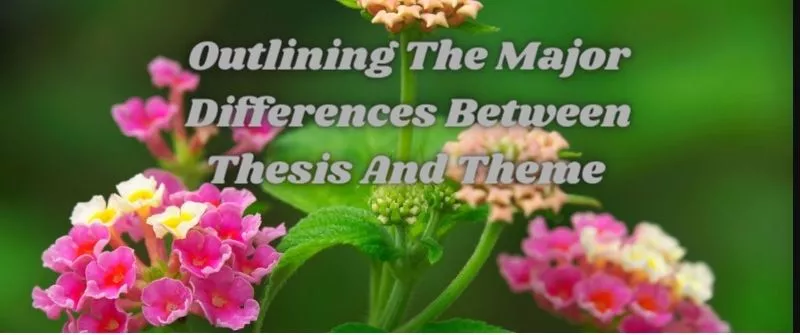- Learning Tips
- Exam Guides
- School Life

Theme vs. Thesis: Key Differences and How to Write each
- by Judy Jeni
- January 18, 2024

Many students confuse between these two terms, a theme and a thesis. In practice, they are two distinct aspects.
By reading the content in this write-up, you will appreciate the difference between the two items. A theme is a central message in a text, whereas a thesis is an argument about a text.
Theme vs. Thesis
While it is possible to write items based on a theme or a project based on a thesis, the two are different. While their focus may seem similar, they are different.
A theme is a focus topic that a writer bases his argument on. It is the direction that guides the points that a writer argues. On the other hand, a thesis is a stand that a writer seeks to prove in his or her writing.
In a theme, a writer bases points on a concept, but in a thesis, the writer writes to prove a specific assertion.
A theme and a thesis are two different items that we can elaborate through the following points:

- A theme is the crucial idea of the piece of literature or any art you are writing about.
- It is the recurrent idea in your work before you identify other elements such as characters, conflict, setting, and plot.
- A thesis is a statement that you will try to prove by backing it with necessary facts. It is a position that the author takes to maintain a particular argument.
Differences between a Theme and a Thesis
- A theme is the general topic of your essay, whereas a thesis is the precise statements that the author tries to prove.
- A theme could be more general as the writer cannot necessarily state it expressly. On the other hand, a thesis is a direct message at the beginning of the paragraph that indicates what the entire paper will be talking about.
- A theme is the motif of the piece or an underlying idea, whereas the thesis is the argument in favor of something that you believe you are presenting to your audience.
How to Write a Theme Based Essay
A theme-based essay writes about something based on a theme that you can derive from a novel, song, or short story. Before you begin to write such an essay, you should identify the underlying theme in your literature work.
Steps When Writing a Theme Based Essay
1. identify the character.

One should locate the characters that you will discuss in the essay. Such should relate to the identified theme in your essay.
For instance, if you locate ‘violence’ in the novel ‘The Shadow of Death,’ it is reasonable to talk about the characters that promote violence in the novel.
2. Maintain the Chosen Theme
As indicated above, suppose violence is the main theme in the novel, then you should maintain the same thing by writing about violence. Such could include incidences of violence, including blood baths and more.
The point is you should endeavor to remain as close to the theme of violence by highlighting incidences and situations from the novel, drama, or story.
3. Avoid Mixing the Theme with the Key Subject
A theme is not a plot but an idea that binds up the story. It is the message that the author wants to convey to the audience or the readers. It is, therefore, wrong to try to write on the plot or story. Stick to the idea only.
Let your thoughts remain organized and well-knitted in the essay body. In the same vein, the body should relate to the central theme as you refer to the characters and incidents in the source matter.
How to Write a Thesis
One can use the following steps to come up with a strong thesis statement:
Start with a Question

One should come up with a question in case the assignment did not offer the question.
After that, you should state your topic, which is the essential idea of the paper.
This thesis statement is usually a phrase or a few words that summarize the main subject of your paper.
The thesis statement makes the topic to be as precise as possible.
Write an Initial Answer
After performing initial research, it is now time to formulate a tentative answer. At this point, it could be just simple, or you can craft it to guide the process of writing and researching.
In case you are writing an argumentative essay, your answer should take a position on the matter. This is different from a thesis statement. Check more about thesis statements to know the idea of the two.
Develop the Answer
This section should prove why you believe it is your answer and convince the reader to agree with your position.
The more you write about the topic, the more you develop more details for your response. The final essay should summarize your overall arguments.
One should know what they are trying to prove in a topic. While you are expressing your opinion, it is vital to state one major idea. Also, you should name the topic and state something specific about it.
Furthermore, you should take a position and back it up with facts and reasons as an author. It is vital to support your reasons with evidence and logical facts.
Include Opposing Viewpoint
The correct thesis statement should acknowledge that there is another side of the argument. It is excellent to include your opposing viewpoints in your opinion. It is also essential to capture another person’s view who may have a different opinion about your topic.

- TUITION-FREE
- REQUEST INFO
- CURRENT COURSES
- REGISTER FOR CLASSES

Theme vs. Thesis Statement vs. Topic Statement
by Kinglove | Writing
Related article: What is a thesis?
A thesis statement is a statement that says what you are going to argue or prove, not what you’re going to attempt to do. It’s not your plan but your argument.

Identifying a thesis
“The first thing to remember is that a thesis is the point the author is trying to prove . That means that a topic, which can be expressed in a phrase, like “alcoholism” or “effect of corruption on poverty,” is not a thesis. A thesis can only be expressed by a complete, declarative sentence (not a question, either). So, be sure to write out a complete sentence when identifying the source’s thesis.
Often, all you need to identify the thesis of an article is the abstract —the brief summary, usually just a short paragraph, provided with the listing of many articles in most databases. This explains the main idea of the article and states what point it is trying to prove.
However, an abstract is not always provided. In those cases, you may need to read the first few paragraphs to get the gist of the article. This is typically where the author will lay out the argument and, again, state the point that they are trying to prove. In more difficult cases, it may be necessary to read the conclusion as well since this is often where they sum up the argument one last time. Sometimes, it’s clearer in the conclusion than in the introduction.
With books, the thesis may be stated on the back, on the jacket flap, in the preface or introduction, or early on in the first chapter. On the back and on the jacket look for phrases like “the author argues that…” In the preface, introduction or first chapter, look for “I argue…” or similar phrases.
Keep in mind: Reference works do not have theses. Remember the definition of a thesis: a point that an essay is trying to prove. Reference works don’t try to prove a point. They simply report information. Usually it’s the more in-depth general interest works, and especially the scholarly sources, that have theses. So those are the ones you’ll want to focus on.” From Shoreline community college.
Merriam Webster’s dictionary:
Definition of thesis:
“a: a proposition to be proved or one advanced without proof: HYPOTHESIS
“ 5.3 Turn Your Working Hypothesis into a Claim We described the early stages of research as finding a question and imagining a tentative answer. We called that answer your working hypothesis. Now as we discuss building an argument to support that hypothesis, we change our terminology one last time. When you think you can back up your hypothesis with good reasons and evidence, you’ll present that hypothesis as your argument’s claim . A claim is an assertion (which could be one sentence or several) that demands support. Your main claim is the assertion supported by your whole research argument. Some call this assertion your thesis. ” From the Turabian Manual, 9th Edition
Thesis Statements vs. Topic Statements
“ Thesis Statements Every paper must argue an idea and every paper must clearly state that idea in a thesis statement. A thesis statement is different from a topic statement. A topic statement merely states what the paper is about. A thesis statement states the argument of that paper. Be sure that you can easily identify your thesis and that the key points of your argument relate directly back to your thesis.
Topic statements: This paper will discuss Harry Truman’s decision to drop the bomb on Hiroshima. The purpose of this paper is to delve into the mindset behind Truman’s decision to drop the bomb on Hiroshima. This paper will explore how Harry Truman came to the decision to drop the bomb on Hiroshima.
Thesis statements: Harry Truman’s decision to drop the bomb on Hiroshima was motivated by racism. The US confrontation with the Soviets was the key factor in Truman’s decision to drop the bomb on Hiroshima. This paper will demonstrate that in his decision to drop the bomb on Hiroshima, Truman was unduly influenced by hawks in his cabinet.” Source: University of Mary Washington.
The theme is the central idea of a piece. It is an implicit or recurrent idea in the work.
“ To identify the central idea or theme, one must also look at the other elements of fiction (plot, characters, setting, conflict, etc.) to explain how the author has tied all of these together. In order to understand the central idea or theme of the story ask yourself the following questions:
- How is the central idea or theme expressed through the characters, setting, point of view, tone, language, or conflict?
- In what way does the resolution of the external conflict indicate the central idea or theme? How does the resolution of the internal conflict express the story’s theme?
- Are symbols, metaphors, or similes used to portray the central idea or theme?
- What are the repeated images, words, or expressions in the story?
- How does the title make sense in terms of the story? Is it significant?
- What the story reveals about society, people in general, the roles of men and women, the time period in which the story takes place?
- Does the central idea make sense in light of the story and the title?
Remember, there is no one way to express the central idea of a story (but some statements are definitely better than others). The best stories have multiple levels of meaning and require MORE THAN ONE READING before the central idea becomes clear. ” http://www.austincc.edu/bvillarr/theme.htm
What is the difference between a thesis statement and a theme?
“Theme is the main idea of the piece of literature, art, film, etc.– whatever it is you are being asked to write about. It is the “lesson” that is being taught. For example, “greed” in an incomplete theme, but “greed is the root of all evil” would be a valid theme of a work.
The thesis is the actual statement in your paper that expresses what the idea behind your essay is. It is what YOUR paper is about, which in turn, is a statement that also conveys what the work being discussed is about. Therefore, a “thesis” normally contains a “theme”. An example might be: In “The Pardoner’s Tale”, Chaucer expresses through both the actions of the Pardoner as well as through the actions of the characters in his tale, the notion that greed is the root of all evil. ” Source: From Yahoo Answers
“There are some very strong parallels between both themes and thesis statements. I think you will find there will be much in the way of responses to how each will be different. For my bet, I would like to think of themes as something that can be found in writing that expresses the intent of what the author is trying to show. Themes can be found in literature and other forms of writing where an idea is explored in a complex and intricate manner. Examples of themes can be courage, the quest for justice, the collision between equally desirable, but ultimately incompatible courses of action, or the notion of identity formation. These themes are proven from a base that is not purely evidential and argumentative, which differentiates them from a thesis statement. For example, when Homer explores the theme of equally desirable, but ultimately incompatible courses of action, he does not do so in a strictly linear and evidential manner. Rather, he shows us a character who must endure such a theme and how it plays out is built within the development of the character. Hektor’s character evolution is how we, as the reader, see Homer’s theme develop.
In contrast to this, a thesis statement is something that is built through evidence, analysis, and persuasion. It seems to me to be more linear and directed than a theme. For instance, a thesis statement can be analytical, which analyzes an idea and deconstructs it through a paper. A thesis statement could also be persuasive, and it hopes to do so through evidence and analysis. The websites below give examples of thesis statements. I think I differentiate both concepts as a thesis statement trying to prove something, while a theme seeks to explore it.” Source: https://www.enotes.com/homework-help/what-difference-between-thesis-statement-theme-110021
Thesis Statements
Related posts:
- Modify Table of Contents (Use Style for Table of Contents) to Format Your Table of Content
- What is a thesis?


- Process , Writing
What are Thesis and Theme?

Going Back to the Basics:
Thesis and theme are two words that everyone knows they know but they typically can’t describe these terms succinctly. Chances are, unless you’re in a writing-dominated field, you probably haven’t given these terms much thought since college or high school English classes. That’s okay, but if you’re embarking on writing a book, you’ll need to brush up on these key terms.
Thesis and theme are the foundations of all writing, professional or informal. They both convey the subject of the text. Despite this similarity, there’s a stark difference between the functions of the thesis and the theme.
The theme of a piece of writing is less intricate than its thesis. A theme is the main idea of a paper. It can be described in a word or short phrase, and these themes are demonstrated throughout the work by the content. Within a longer piece, such as an article or a book, there can be multiple themes. Oftentimes, these are divided by chapters or headings. Theme offers some room for interpretation—while the overall message should be received the same by each reader, the word(s) they use to describe it has some flexibility.
That’s not the case with the thesis statement. A thesis statement is the argument that a writer constructs throughout the work. It can be described in a phrase, sentence, or even a paragraph. The thesis statement must define the purpose of the paper, mention the points you’ll explore, and serve as an abbreviated summary of the work. There’s the misconception that a thesis statement and a topic sentence are interchangeable terms. While the thesis statement may act as a topic sentence, it usually comes later in the introductory text and it’s more specific than topic sentences are allowed to be.
A strong thesis requires some effort and workshopping. When you’re writing the outline for your book, determine the core ideas that you want to discuss, think about your purpose for writing, and then find a way to piece all of the components together. A key to obtaining a good thesis is to unify your key points and be specific about your intentions for the piece.
Let’s take a look at an example:
A paper on traditional vs independent publishing can have themes of diversity, empowerment, change through social media, individual identity, etc. Subheadings would show these themes for each of the sections throughout the paper.
A topic sentence could be: “In the internet age, small independent publishing is growing as an alternative for authors .” This is a fact that can be proven; it doesn’t show the author’s opinion or intention for the paper.
But a thesis statement would be: “ Small presses use social media as a tool to celebrate the diverse voices that they publish while enacting slow scale social change through challenging identities perpetuated by the media.” Now that thesis encompasses a lot of topics that the reader will expect to have reviewed. It also makes an argument for how small presses operate and what their lasting effects might be.
Your thesis should be just as specific, though it doesn’t have to be as polished and complete before you start writing your book. However, you should still have a placeholder thesis statement to guide you through your writing. Later, you can refine your thesis to better reflect the content you cover. I suggest having several people review your thesis statement to make sure it’s 1) clear, 2) concise, and 3) accurately describes what your book is about. If your thesis is still giving you trouble, try completing some thesis exercises, available in most writing books and online.
We understand the fundamental importance of crafting a clear and compelling thesis statement to guide your writing journey. Our experienced team is dedicated to helping you articulate your core ideas and intentions effectively, ensuring that your book’s thesis serves as a strong foundation for your narrative. With our comprehensive publishing services, including writing, editing, and promotion, we can support you every step of the way to transform your manuscript into a polished and impactful book.
Schedule a call with us today to discover how BrightRay Publishing can help you bring your book to life and share your message with the world.
- Emily Batdorf
- July 30, 2021
Recent Posts

Taylor Swift’s Eras Tour Book Shines a Spotlight on Author-Powered Publishing—Here Are 7 Reasons You Should Choose a Hybrid Publisher

In Light of Cher’s New Memoir: 6 Best Practices BrightRay Writers Use to Avoid “Flat” Narratives

What Type of Author Are You? An Indie Publisher Might Be Exactly What You Need.
Ready to talk, get in touch.
- [email protected]
- Winter Park, FL
What's the difference between theme and thesis ?
Definition:
- (n.) A subject or topic on which a person writes or speaks; a proposition for discussion or argument; a text.
- (n.) Discourse on a certain subject.
- (n.) A composition or essay required of a pupil.
- (n.) A noun or verb, not modified by inflections; also, that part of a noun or verb which remains unchanged (except by euphonic variations) in declension or conjugation; stem.
- (n.) That by means of which a thing is done; means; instrument.
- (n.) The leading subject of a composition or a movement.
Example Sentences:
- (1) A world conference in Edinburgh during August 1988 will have the theme.
- (2) That, roughly, was the theme of the Wednesday Play, Cathy Come Home, (BBC1) directed by Kenneth Loach, produced by Tony Garnett.
- (3) as well as nauseatingly hipster titbits – "They came up with the perfect theme (and coined a new term!
- (4) Sometimes it can seem as if the history of the City is the history of its crises and disasters, from the banking crisis of 1825 (which saw undercapitalised banks collapse – perhaps the closest historic parallel to the contemporary credit crunch), through the Spanish panic of 1835, the railway bust of 1837, the crash of Overend Gurney, the Kaffir boom, the Westralian boom, the Marconi scandal, and so on and on – a theme with endless variations.
- (5) By no means is this a new theme, but it has taken on an added sharpness and urgency after the conferences.
- (6) An obsessional artist who was an enemy of all institutions, cinematic as well as social, and whose principal theme was intolerance, he invariably gets delivered to us today by institutions - most recently the National Film Theatre, which starts a Dreyer retrospective this month - that can't always be counted on to represent him in all his complexity.
- (7) Read more Clinton spoke before more than a thousand supporters on Saturday at a launch event for “Women for Hillary” in New Hampshire, touching upon many of the familiar themes of her presidential campaign – equal pay for women, paid family leave, raising the minimum wage.
- (8) The Christmas theme doesn't end there; "America's Christmas Hometown" also has Santa's Candy Castle, a red-brick building with turrets that was built by the Curtiss Candy Company in the 1930s and sells gourmet candy canes in abundance.
- (9) Similar paradoxes bedevilled all the other chief themes.
- (10) Synthesis and discussion is focused on five major areas in which gerontological continuity and change are evidenced: 1) transformation of basic themes over time; 2) gerontology's identity crisis; 3) the social ideology of gerontology; 4) evolution and refinement of gerontological ideas and methods; and 5) temporal frameworks.
- (11) A key theme is expected to be that early intervention at every stage of life can prevent society having to continue "paying for the costs of failure".
- (12) One constant theme is the wish for the Dalai Lama to return."
- (13) The national anthems Nothing to say about the Indian anthem, but the New Zealand one sounds like the theme tune for an 1960s ATV variety spectacular.
- (14) Ever since the ex-PD leader Walter Veltroni started praising President Kennedy as a way to jettison communism, this has been an abiding theme, manifesting itself institutionally in the desperate attempt to engineer a US-style two-party system through breathtakingly inept electoral reforms – the latest one, the " Porcellum " (after porcello, swine), was behind the impasse earlier this year.
- (15) Ladybird: I’m Ready to Spell has a space theme, and is based on the phonics that kids will be learning in their first years at school.
- (16) Bleak jokes and cartoons have been circulating for weeks in the anti-Assad camp on the theme of barrel bombs serving as ballot boxes.
- (17) Redesigning the dream was identified as the integrative theme in the substantive theory that described how family members gradually modify their beliefs about organ transplantation and develop attitudes and beliefs to meet the challenge of living with continual unpredictability.
- (18) Oil operators, large and small, are very keen to address the key themes of the waste hierarchy.
- (19) And they kept coming … the hilarious Octodad: Dadliest Catch , the chilling psychological horror game Daylight , which again, uses procedural generation to create new environments (procedural content is another next-gen theme); and Galak-Z from 17bit Studios, described as an AI and physics-driven open-world action game.
- (20) Cross-sectional as well as longitudinal comparisons indicated that the subjective sexual arousal elicited during fantasy depicting specific themes was stable across the menstrual cycle.
- (n.) A position or proposition which a person advances and offers to maintain, or which is actually maintained by argument.
- (n.) Hence, an essay or dissertation written upon specific or definite theme; especially, an essay presented by a candidate for a diploma or degree.
- (n.) An affirmation, or distinction from a supposition or hypothesis.
- (n.) The accented part of the measure, expressed by the downward beat; -- the opposite of arsis.
- (n.) The depression of the voice in pronouncing the syllables of a word.
- (n.) The part of the foot upon which such a depression falls.
- (1) Why would you want to boost him?” The president is accused of trying to distract from domestic problems – corruption scandals and an exposé showing he plagiarised parts of his law-school thesis – by attending to Trump.
- (2) Data interpretation confirms the well-known thesis that reproductive health protection is not only of a medical and biological but of very wide interdisciplinary interest when the woman is on the brink of the important for her personally and finally for the society as well decision pro and con real pregnancy.
- (3) The data favor the thesis that neutralization of BVD virus occurs by a multi-hit mechanism and requires combination of at least two molecules of antibody with each virus.
- (4) Clinical material is used to illustrate this thesis.
- (5) I went to work at Carville at the invitation of Dr. Kirchheimer, who had seen my Ph.D. thesis.
- (6) The striking weakness of Clegg's thesis was what it left out in its attempt to carve out a position for restless party activists as their poll ratings dip (down to 14% according to ICM) as Miliband tones down his own anti-Lib Dem rhetoric to woo them.
- (7) The thesis considered was that angiotensin II may have a greater role in the fetus than in the adult since the autonomic nervous system does not develop fully until late in gestation.
- (8) My immediate suspicion is that the pupil is taking the same course as the master, though I accept it is a large thesis to hang on beige furnishings.
- (9) Doctors who were general practitioners in the period 1973-88 and had written a successful MD or PhD thesis were identified.
- (10) A leaked cabinet committee memo in 2010 showed coalition ministers were advised on coming into government that it was wrong "to regard radicalisation in this country as a linear 'conveyor belt' moving from grievance, through radicalisation, to violence … This thesis seems to both misread the radicalisation process and to give undue weight to ideological factors".
- (11) The present thesis focuses on the etiology, diagnosis, progression and prevention of dentoalveolar ankylosis.
- (12) As previously observed the fraction that escapes depends on the solvent viscosity [Marden, M. C. (1983) Ph.D. Thesis, University of Illinois-Urbana].
- (13) Hakim is keen to stress that her thesis is "evidence based" and nothing to do with prejudice or ideology, and finishes her introduction with this rallying cry: "why not champion femininity rather than abolish it?
- (14) The results obtained will allow to test experimentally the theoretical predictions made by A. Goldbeter (1973) PhD thesis, Université Libre de Bruxelles, on the distribution of carbamoyl phosphate and the oscillation of its intracellular concentration.
- (15) These data support the thesis that cell transport of calcium is accomplished by the attachment of calcium atoms to the cell surface and transport through the plasma membrane bound to either specific carriers or to membrane constituents.
- (16) To illustrate his thesis he presents the case history of a man who was fatally affected by the family myth and mystification process.
- (17) The present studies were designed to estimate fetal weight on the basis of the thesis that the factors which determine body weight include the fetal bone and the amount of fetal soft tissue, i.e., fetal corpulence.
- (18) We describe an approach that is based on the thesis that dermatologists can and often should treat such patients.
- (19) For that reason the electron microscope method with an optically higher resolution was chosen for this thesis.
- (20) Both polyribosomes and 70S ribosomes that were isolated on sucrose density gra dients and tested separately in cell-free systems were capable of protein syn thesis; however, polyribosomes formed more protein per unit of RNA than monosomes did.
Words possibly related to " theme "
Words possibly related to " thesis ".
introduction
proposition
CompareWords
what is the difference between theme and thesis


IMAGES
COMMENTS
Jan 18, 2024 · A thesis is a statement that you will try to prove by backing it with necessary facts. It is a position that the author takes to maintain a particular argument. Differences between a Theme and a Thesis. A theme is the general topic of your essay, whereas a thesis is the precise statements that the author tries to prove.
Thesis Statements vs. Topic Statements “Thesis Statements Every paper must argue an idea and every paper must clearly state that idea in a thesis statement. A thesis statement is different from a topic statement. A topic statement merely states what the paper is about. A thesis statement states the argument of that paper.
Theme vs Thesis: The Main Differences & When To Use Them. Regarding discussing the difference between theme and thesis, it is essential to understand the distinct roles they play
Topic and Thesis Differences A topic is the subject one decides to write about. It can be as general as “vegetables” and as specific as “how tomatoes can improve a person’s metabolism.” A thesis is what one decides to say about the “topic.” The thesis is a specific argument that will be
Jul 30, 2021 · Thesis and theme are the foundations of all writing, professional or informal. They both convey the subject of the text. Despite this similarity, there’s a stark difference between the functions of the thesis and the theme. The theme of a piece of writing is less intricate than its thesis. A theme is the main idea of a paper.
Jan 18, 2024 · A theme is a central messaging in one edit, and a thesis is an argument about a text. What is Theme Definition, Examples of Theme in Reference Writing Explicated. Topic opposed. Thesis. While it be possible to write items based on a themes or a project basing on a research, the two are different. While their focus may seem same, they were ...
Definition: (n.) A position or proposition which a person advances and offers to maintain, or which is actually maintained by argument. (n.) Hence, an essay or dissertation written upon specific or definite theme; especially, an essay presented by a candidate for a diploma or degree.
A thesis, or dissertation (abbreviated diss.), is a document submitted in support of candidature for an academic degree or professional qualification presenting the author's research and findings. In some contexts, the word "thesis" or a cognate is used for part of a bachelor's or master's course, while "dissertation" is normally applied to a ...
Learning Tips; Exam Guides; School Life; Theme vs. Thesis: Key Differences and How to Write each. by Judy Jeni; January 18, 2024; Many students confuse between these two terms, a
(AKA theme). Thus, it would behoove you to know the difference between a theme and a thesis statement. THEME-1. the abstract idea or concept dealt with in the novel, play or poem. THESIS-1. a direct answer, formulated as an argument, in response to a prompt.